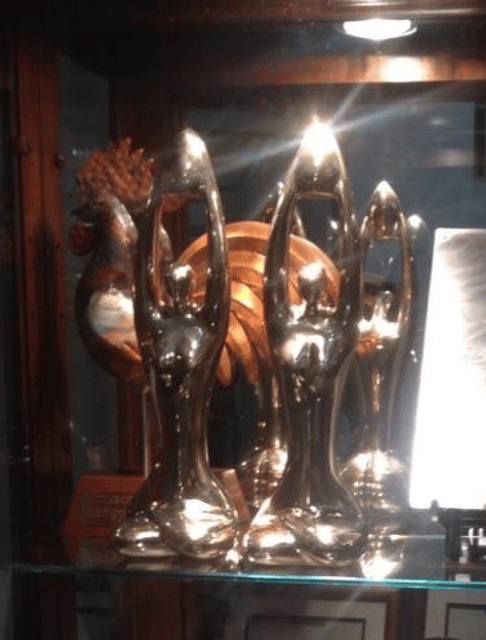Félix Award

Félix Award

| Felix Award | |
|---|---|
| Awarded for | achievements in Quebec's music recording and humour industry |
| Country | Canada |
| Presented by | Association du disque, de l'industrie du spectacle québécois (ADISQ) |
| First awarded | September 23, 1979 |
| Website | gala.adisq.com [5] |
The Félix Award (French: Trophée Félix or Prix Félix) is an award, given by the Association du disque, de l'industrie du spectacle québécois (ADISQ) on an annual basis to artists working in the music and humor industry in the Canadian province of Quebec.
| Felix Award | |
|---|---|
| Awarded for | achievements in Quebec's music recording and humour industry |
| Country | Canada |
| Presented by | Association du disque, de l'industrie du spectacle québécois (ADISQ) |
| First awarded | September 23, 1979 |
| Website | gala.adisq.com [5] |
The award
The first Félix awards were presented on September 23, 1979. The idea belonged to the first president of ADISQ, Gilles Talbot. The award trophy was created by Marc-André Parisé.
The awards are named in honour of Quebec songwriter Félix Leclerc.[1]
In contrast to the Juno Awards, whose nominations are based on record sales, nominations and winners of the Félix are decided by ADISQ members. The awards are given during an annual ceremony "Gala de l'ADISQ". Among the categories are Best-selling album, Best album (in various music genres), Songwriter of the year, Composer of the year, Song of the year, Male/Female singer of the year, Discovery of the year, Show of the year, etc.[2]
The awards have sometimes been controversial. In 1983, songwriter Luc Plamondon attracted controversy by using his acceptance speech to denounce copyright law. In 1991, Céline Dion publicly refused the Félix for anglophone artist of the year for her English-language album Unison, not considering herself an anglophone artist. Instead she suggested to ADISQ to create a new award category for an artist who achieved the most success internationally. The next year such category was indeed created : Most successful artist performing in a language other than French (French: Artiste s’étant le plus illustré dans une autre langue que le français)[3]
Partial list of recipients
April Wine
Beau Dommage
Daniel Bélanger
Daniel Boucher
Isabelle Boulay
Gerry Boulet
Édith Butler
Marie Carmen
Robert Charlebois
Martine Chevrier
Jim Corcoran
Sylvain Cossette
Richard Desjardins
Céline Dion
Marc Drouin
Diane Dufresne
Jean-Pierre Ferland
Pierre Flynn
André Gagnon
Garou
Corey Hart
Laurence Jalbert
La Bottine Souriante
Les Cowboys Fringants
Julie Lamontagne
Pierre Lapointe
Daniel Lavoie
Jean Leloup
Hubert Lenoir
Loco Locass
Loud
Marjo
Patrice Michaud
Ariane Moffatt
Davide Monteduro
Kevin Parent
Bruno Pelletier
Marie Denise Pelletier
Paul Piché
Michel Rivard
Richard Séguin
Martine St-Clair
Diane Tell
Fabienne Thibeault
Marie-Chantal Toupin
Uzeb
Roch Voisine
Andrée Watters
Cœur de pirate
Garolou
Gaston Miron
See also
List of Quebec musicians
Music of Quebec
Culture of Quebec